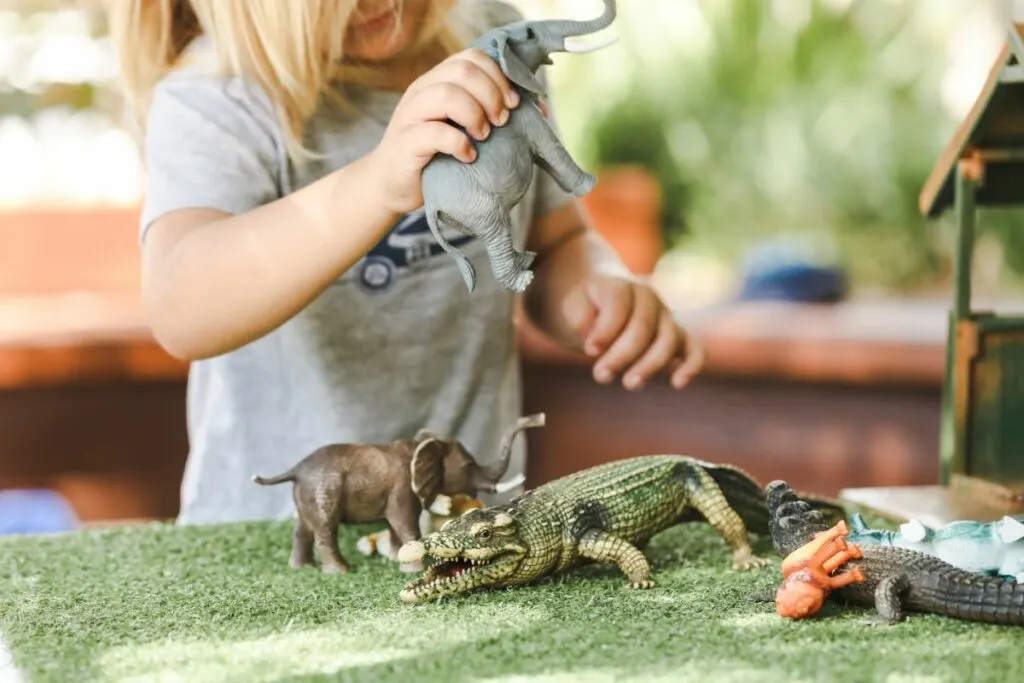Navigating the first steps in your child’s education journey can be both thrilling and daunting.
For parents choosing to homeschool their kindergarteners, creating an effective and engaging curriculum is crucial.
In this guide, we will provide a clear pathway to developing a homeschooling kindergarten curriculum that aligns with your little one’s learning needs and interests.

We will explore the best syllabus options and essential elements of a kindergarten curriculum and highlight reputable providers offering comprehensive kindergarten curricula.
Let’s get into it.
Which Syllabus Is Best for Kindergarten?
Selecting the right syllabus for your kindergartener is a foundational decision.
The best syllabus for kindergarten homeschooling blends fundamental academics with exploratory learning.
A balanced approach incorporating basic literacy, numeracy, physical development, creative expression, and social skills is ideal.
The choice of syllabus should be guided by your educational philosophy, family beliefs, your child’s learning style, and the goals you set for your homeschooling experience.
We’ll explore this more in the following sections.
What Should Be In A Kindergarten Curriculum?
A comprehensive kindergarten curriculum should cover the following key areas:
- Literacy: Introduce your child to the basics of reading and writing. Focus on phonemic awareness, alphabet recognition, and simple reading exercises. Storytelling and interactive reading can enhance language development and provide a lot of fun.
- Numeracy: Basic math concepts, including counting, number recognition, simple addition and subtraction, and understanding shapes and patterns, form the core of kindergarten math.
- Science: Encourage curiosity about the natural world. Simple experiments, nature walks, and observations foster scientific thinking (and a good excuse to get outside and enjoy some fresh air!)
- Social Studies: Introduce basic concepts about communities, cultures, and geography. This can be through simple stories, maps, and community visits.
- Arts and Crafts: Activities like drawing, painting, and crafting help develop fine motor skills and encourage creativity. With these, children don’t even realize they’re learning as they have lots of fun.
- Physical Education: Incorporate activities that enhance physical development, coordination, and motor skills – allowing your little one to burn off some energy.
- Social and Emotional Learning: Group activities, even with family members, can teach social skills, sharing, and emotional self-regulation.
Creating Your Own Kindergarten Curriculum
Designing your own curriculum offers the flexibility to tailor educational content to your child’s unique needs.
Begin by setting clear goals for what you want your child to achieve by the end of the kindergarten year.
Research various educational philosophies and teaching methods to find what resonates with your family’s values and your child’s learning style.
Utilize a mix of structured activities and free play to keep learning engaging and balanced.
Remember to incorporate regular assessments, not as formal tests, but as observations and informal check-ins to gauge your child’s understanding and progress.
Adjust the curriculum as needed based on these assessments.
Providers Offering Kindergarten Curriculums
Numerous providers offer comprehensive kindergarten programs for parents looking for structured curriculum options. These include:
- Time4Learning: This is a popular online platform that provides interactive lessons in core subjects.
- Sonlight: Sonlight is known for its literature-based curriculum, integrating stories and reading into all subject areas.
- Abeka: They offer a traditional approach with a focus on foundational skills in reading, writing, and arithmetic.
- Oak Meadow: Oak Meadow provides a nature-based, creative curriculum aligning with holistic education principles.
- Calvert Education: This is a well-rounded curriculum that combines traditional and innovative teaching methods.
When exploring these options, consider your child’s learning preferences, your teaching comfort level, and the flexibility each program offers.
Many providers allow customization of their curriculum to suit individual needs.
We’ll look into some of these providers in a little more detail later on in the article when we consider accreditation.
What Should A Child Know By The End Of Kindergarten?
By the end of kindergarten, a child typically reaches several key developmental and educational milestones, marking the foundation of their formal education.
In literacy, a child should recognize and write most letters of the alphabet and begin to understand the connection between letters and sounds.
Basic phonemic awareness, such as identifying beginning sounds in words and the ability to read some simple words and short sentences, are also crucial skills.
In numeracy, children are expected to count to at least 20, recognize numbers, understand basic concepts of addition and subtraction, and identify common shapes.
Socially and emotionally, kindergarteners should be able to follow rules, work both independently and cooperatively in groups, and communicate their needs and thoughts effectively.
They should also show progress in fine and gross motor skills, like using scissors, holding a pencil correctly, and participating in physical activities.
As well as this, kindergarteners often gain a basic understanding of concepts in science and social studies, such as weather patterns, plant life, community roles, and cultural awareness.
By the end of kindergarten, children should exhibit increased independence, curiosity, and the ability to engage in creative play and problem-solving activities.
These foundational skills set the stage for successful progression into more advanced learning in the subsequent grades.
Different Types Of Kindergarten Homeschooling Approaches
Below, we’ve highlighted just a few of the approaches you can take for homeschooling your kindergarten children.
Does A Montessori Approach To Homeschooling Work For Kindergarten?
Implementing a Montessori approach in your homeschooling curriculum can be highly effective for kindergarten.
The Montessori method, with its emphasis on child-led learning, hands-on activities, and a prepared environment, aligns well with the developmental needs of kindergarteners.
In a Montessori homeschool, your child has the freedom to explore their interests at their own pace, which is crucial for fostering a love for learning at this age.
The method’s focus on sensory-based learning and practical life skills also ensures that kindergarteners develop a strong foundation in both academic and life skills.
However, it requires a commitment from parents to create and maintain a Montessori-friendly learning environment and to adapt to a child’s evolving needs continuously.

How To Implement A Christian Kindergarten Homeschool Curriculum
Creating a Christian kindergarten homeschool curriculum involves integrating faith-based principles with academic learning.
Start by selecting materials and resources that align with your Christian values.
This might include Bible study, Christian storybooks, and activities that incorporate Christian teachings.
Emphasize character education, instilling values such as kindness, patience, and respect.
Include prayer and worship as part of your daily routine. It’s also important to choose academic materials that are compatible with a Christian worldview, ensuring that subjects like science and history are taught from a perspective that aligns with your faith.
Additionally, participating in a local church’s children’s programs or joining a Christian homeschooling group can provide your child with opportunities for fellowship and community learning.
Choosing An Accredited Kindergarten Homeschool Curriculum
Opting for an accredited kindergarten homeschool curriculum ensures that your child’s education meets certain standards and can be particularly important for future educational transitions.
When selecting an accredited program, verify the accreditation status through recognized accrediting agencies.
Accredited programs often offer well-rounded curriculums that cover all key learning areas and provide resources and support for parents.
They also typically provide records and assessments that can be useful for tracking your child’s progress and for any necessary reporting to education authorities.
However, it’s crucial to ensure that the curriculum aligns with your educational goals and your child’s learning style, as accreditation alone does not guarantee a good fit for every child.
Here are some examples of accredited homeschool kindergarten curriculums:
- Calvert Education: Calvert is well-known for its comprehensive and accredited homeschooling programs. They offer a kindergarten curriculum that covers all the essential academic subjects, with an emphasis on building strong foundational skills in reading, writing, and math.
- Abeka Academy: Abeka provides a biblically-based, accredited homeschool program. Their kindergarten curriculum includes phonics-based reading, hands-on math, and a range of subjects delivered from a Christian perspective.
- K12: This online public school option is available in many states and is accredited by various regional accreditation agencies. K12’s kindergarten curriculum focuses on foundational literacy and math skills while also incorporating science, social studies, art, and music.
- BJU Press Homeschool: Offering a Christian education, BJU Press Homeschool is another accredited option. Their kindergarten program includes a mix of traditional learning materials and online resources, covering fundamental subjects with a biblical worldview.
- Oak Meadow School: Oak Meadow’s curriculum is accredited by the Middle States Association of Colleges and Schools. They provide a creative, experiential kindergarten program that encourages natural learning opportunities and includes subjects like math, reading, arts, and science.
- Bridgeway Academy: Accredited by AdvancED and the National Association of Private Schools, Bridgeway Academy offers a flexible homeschooling program for kindergarten, with a variety of curriculum options to suit different learning styles and educational needs.
Final Thoughts
Creating a homeschooling kindergarten curriculum is a journey that requires careful planning, but it also offers a unique opportunity to craft an educational experience that perfectly suits your child.
It’s an exciting chance to choose an engaging education program that both you and your child can enjoy.
Whether you choose to design your own curriculum, follow a Montessori approach, implement a Christian-focused curriculum, or opt for an accredited program, the key is to ensure that it fosters a love for learning, covers essential educational milestones, and aligns with your child’s and family’s educational goals.
We recommend building plenty of socialization, play, and outdoor learning into whichever curriculum or approach you use so that you can learn and make memories along the way.
Remember, the goal of kindergarten is to lay a solid foundation for lifelong learning, making the process as enjoyable and enriching as possible for your child.
- Homeschooling In High School: Pros And Cons - February 24, 2024
- How Do I Withdraw My Child From School To Homeschool? - February 23, 2024
- How To Not Go Crazy Homeschooling Kids: A Guide For Frazzled Parents - February 22, 2024









Leave a comment